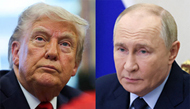
The best way to understand this turn was to recognize that personnel are policy, and since “Trumpism” was an unexpected irruption and Trump himself is not exactly the sort of guy who worries about having a policy brain trust, the people available to staff and guide his administration were inevitably more conventionally conservative than the half-sketched ideas of his campaign. Once Steve Bannon, the only inner-circle figure with an ideological vision, flamed out spectacularly as a Karl Rove-like eminence, a default to Ryanism was all-but-guaranteed, and with it the abandonment of Trump’s promise to remake the G.O.P. as a “worker’s party.”
But if that was the major policy story of year one, the drift of Republican policymaking since the failure of Obamacare repeal has been a little different, a little more populist, a little closer to the way that Trump campaigned. Even without a Bannon-like figure consciously shaping policy, Trumpism still exerts a gravitational pull on the Republican Party, because its broad outlines are actually popular in a way that the austerian elements of the overlapping Ryan and Tea Party agendas never really were.
This pull exerted itself weakly but meaningfully on the tax bill, which was dominated by a corporate tax cut but also reshaped around the edges to cut more taxes for the middle class and families. It exerted itself a little more on Trump’s decision to replace Janet Yellen as Federal Reserve chairman with Jerome Powell, which amounted to a vote for a looser monetary policy rather than the hard-money approach that Republicans had consistently favored under Obama. And then on the budget that just passed Congress, Trumpism was more like a Death Star tractor beam, dragging the G.O.P. well away from all its professed Obama-era priorities: Gone was the sequester, gone was all the talk of cutting and capping and balancing, and instead we got a guns-and-butter budget that would have done Lyndon Johnson or George W. Bush proud.
Combine this flood of spending with the Trump White House’s attempt to get a skills-based and restrictionist immigration reform through Congress, throw in some smaller ideas under consideration, like the Marco Rubio-Ivanka Trump paid parental leave plan, and you have a Year 2 of the Trump era in which Trumpism actually seems meaningful again. Not as a completely coherent agenda, obviously, but as a tendency, a force pulling conservatism toward a nationalism-infused deficit-financed populism even when Ryan and Mick Mulvaney are theoretically setting the agenda.
This populist pull makes hypocrites of many Republican legislators, as liberals are eager to point out, since it induces them to vote for budgets that they would have denounced as socialism under Barack Obama. But there is pathos to the hypocrisy as well as cynicism. Republicans denounce big spending while in opposition because opposition offers the luxury of principle, and then they accept spending once in power because the nature of governance make them feel like prisoners of the public’s will … and then they look forward to defeat, at some level, because it liberates them to return the true faith, free of the corrupting responsibility to please a public bigger than their base.
But if the pathos is real, it is also ultimately somewhat stupid. A political party is not a church with standards too holy for this world, stooping to govern and then reclaiming its sanctity once it returns to opposition. Conservatism should be a governing philosophy, not an endless cycle of corruption followed by exile and repentance. And the fact that “populism” or “Trumpism” — like “compassionate” or “big government” conservatism before it — exerts an inevitable pull on Republican administrations and majorities is a sign that a Trumpian or George W. Bushian mix of cultural conservatism and economic populism is in fact the natural basis for an American center-right majority, resisted only by a Republican ideological apparatus that persists in believing in a limited-government ideal so fine no actual government can implement it.
This reality was apparent to Trump, in his crude and demagogic way, as it was apparent to Bush before him. But it is not apparent to enough Republicans at the moment for the party to act on it effectively. So instead of a clear focus on the kind of populism that might advance conservative priorities — direct spending to support work and family and marriage, above all — we get doomed cavalry charges against popular programs followed by a shrugging acceptance of more funding for the welfare-state status quo.
Trump is not the right man to break this cycle. But the recent drift back toward campaign-season Trumpism in defiance of the White House’s official blueprints is a sign for those with eyes to see. The populist center-right is the only place where Republicans can stand and plausibly hope to govern. It would be nice if someday they tried to do so, not haphazardly and hypocritically and often stupidly, but intelligently and consistently and well.
<ROSS DOUTHAT>
스마터리빙
more [ 건강]
[ 건강]이제 혈관 건강도 챙기자!
[현대해운]우리 눈에 보이지 않기 때문에 혈관 건강을 챙기는 것은 결코 쉽지 않은데요. 여러분은 혈관 건강을 유지하기 위해 어떤 노력을 하시나요?
 [ 건강]
[ 건강]내 몸이 건강해지는 과일궁합
 [ 라이프]
[ 라이프]벌레야 물럿거라! 천연 해충제 만들기
 [ 건강]
[ 건강]혈압 낮추는데 좋은 식품
[현대해운]혈관 건강은 주로 노화가 진행되면서 지켜야 할 문제라고 인식되어 왔습니다. 최근 생활 패턴과 식생활의 변화로 혈관의 노화 진행이 빨라지고
사람·사람들
more
‘K-팝 아카데미’ 열린다
LA 한국문화원(원장 이해돈)은 ‘2025 K-팝 아카데미’를 7월28일(월)부터 8월15일(금)까지 미 3개 도시에서 개최한다고 밝혔다.LA…

GIFT 전인 코칭 전문학교 특별 세미나
상담, 코칭, 의학, 영성을 통합한 독자적인 교육 철학을 지닌 GIFT 전인 코칭 전문학교가 지난달 28일‘관계 회복과 소통’을 주제로 한 특…
교육원 ‘해질녘 인문학 특강’ 성료
LA 한국교육원(원장 강전훈)은 지난달 20일부터 7월2일까지 3회에 걸쳐 한인 성인을 대상으로 한‘해질녘 인문학 특강’을 진행했다. 이번 특…
가정상담소, 건강한 한인가정 만들기 교육
KFAM(한인가정상담소·소장 캐서린 염)은 지난달 16일부터 27일까지 한인 종교지도자들을 대상으로 한 ‘가정폭력 40시간 전문가 교육과정’을…
[커뮤니티 게시판] 민족학교 청소년 풍물교실 중·…
민족학교 청소년 풍물교실 중·고교생 대상 14일부터이민자 정치력 향상과 청년 리더 양성 등 활동을 하고 있는 민족학교(KRC)가 중·고교생을 …
많이 본 기사
- [트럼프 감세법안 세부 내용과 영향 분석] 감세·복지 축소… 미 경제·사회 전반에 큰 파장
- 저소득층 복지 축소 감세법안 최종 통과
- [집중취재 - 문턱 너무 높은 SSA] 사회보장국 방문 ‘하늘의 별따기’
- 또 대형 총기난사… 4명 사망·14명 부상
- “충전 중 휴대폰 베개 밑에 두면 자칫 발화한다”
- “영주권만으론 안심 못하겠다”
- 박수홍, ♥김다예·딸 광고 수익 대박났다.. “나를 뛰어넘을 듯”
- “동포단체 지원사업 신청 받아요”
- [에비앙스 워터] “에코 연수기로 식수·샤워수 동시 해결”
- 내 돈은 안전할까? 은퇴 연금의 진짜 이야기
- [인쌩맥주] “MZ 세대가 반한 주점 글로벌 진출”
- “북한에서도 ‘미용 성형수술’ 활발”
- 이윤미, ♥주영훈 응급실 行→긴급 수술 후 근황 “빠르게 회복”
- 행정실수로 추방됐는데 구타·고문
- “메디케이드 정보 ICE 제공은 불법” 소송
- “병원과 집에서 안전하게 픽업해드립니다”
- 한국 떠나는 부유층, 전년대비 2배↑
- 명품 브랜드의 ‘문화 도용’ 논란… 프라다, 인도 전통 샌들 표절 의혹
- [경제이슈 분석] “업무 핵심 도구된 AI”…직장 활용도 두배 폭증
- LA시, 10억달러 적자에 ‘재정비상’ 선포
- IRA로 롱컴케어보험 가입하기
- 트럼프, ‘감세법안’ 통과에 “경이적 승리…美에 최고 생일선물”
- ‘기생충’, NYT 독자가 뽑은 ‘21세기 최고영화’도 1위
- [한국춘추] 젖은 낙엽
- [BHC 치킨] No.1 치킨 브랜드 ‘BHC’, 새로운 도약
- 재미한인 직업교육센터 여름학기 수강신청 받아
- 한국 파라타항공, 내년 북미 취항
- 트럼프, "맘다니에 불법체류자라는 사… 1
- 가상화폐 업체 리플, 은행 인가 신청
- 폐업한 한인업소… 낙서로 ‘뒤범벅’
- 리버풀 공격수 조타, 차 사고로 숨져…결혼 10여일 만에 비극
- MS, 또 9,000명 해고 올해 구조조정 본격
- 소이현♥인교진, 결혼 12년차에도 대학생 같네..사랑스러운 커플룩 완성
- [전익환 프로의 골프교실] 방향 정렬
- 폭염·산불 비상… 기후변화에 경각심을
- [살며, 느끼며] 여름방학, 부모가 할 일
- 북유럽 여성징병제
- 무역적자 다시 확대 5월 113억달러 증가
- 트럼프, 일본 이어 한국 겨냥?… LNG 앞세워 달랜다
- 독립기념일 관공서 휴무 총영사관·은행도 문닫아
- 열애설無→11월 결혼..걸스데이 민아♥온주완, 배우 부부 탄생
- “미군 한국전 참전용사들의 희생에 감사”
- “다양한 여름 프로그램 준비해요”
- 대통령 기자회견, 재외동포 목소리 담아야
- 우수수 떨어진 미 주식… 중학개미만 웃었다
- “사우디 아람코도 딥시크 깔아”
- 프랑스 관제사 파업 항공기 1,500편 취소
- ‘주택정보 박람회’ 뜨거운 관심
- 롯데그룹 신용등급 하락, 파킹형 ETF도 영향받나
- “버지니아를 MD로 만들지 말자”
1/5지식톡

-
 찬양팀 & 선교팀
0
찬양팀 & 선교팀
0남가주 멕시코 선교팀 & 찬양팀 에서 도네이션 받습니다 모든 악기 종류,악세사리, 앰프,스피커, 마이크,통기타, 전기기타, 자전거, 스쿠터,모터싸이클,드럼,키보드, 색소폰, 트럼펫, 트롬본, 베이스기타,방송 장비들…
-
 오이지 만드는 법
0
오이지 만드는 법
0안녕하세요, 보통 페르시안 오이는 쉽게 물러서 오이지를 담지 않는데요, 혹시 오이지를 만드시는 분이 계실까요? 지식나눔을 해 주신다면 감사 하겠습니다. ((꾸벅))
-
 미국세무사 시험 준비반 개강합니다
0
미국세무사 시험 준비반 개강합니다
0미국 연방세무사 (IRS Special Enrolled Agent) 시험 준비 재택공부6월2일(월) zoom를 이용한 실시간 화상강의 개강월 수 금 중부시간 저녁 9시부터 10시반까지실시간 화상 강의에 참여가 곤…
-
 한국담배보내드립니다
0
한국담배보내드립니다
0한국담배보내드립니다편의점담배 및 면세담배보내드립니다문의:voicema 카톡입니다
-
 애틀랜타 부동산 세미나에 초대합니다
0
애틀랜타 부동산 세미나에 초대합니다
0네오집스가 애틀랜타에 갑니다!안녕하세요? 미국 부동산 네오집스입니다.미국 부동산, 앞으로 어떻게 변화할까요?애틀랜타는 지금 주목해야 할 지역일까요?미국 부동산 시장의 흐름부터 애틀랜타 지역의 최신 동향까지!부동산 …
케이타운 1번가
오피니언
 양상훈 수필가ㆍ시인
양상훈 수필가ㆍ시인 [한국춘추] 젖은 낙엽
 김인자 시인
김인자 시인 [금요단상] 인공지능과 책
 최호근 / 고려대 사학과 교수
최호근 / 고려대 사학과 교수 [역사속 하루] 소로가 월든 숲에 터잡다
 임석훈 / 서울경제 논설위원
임석훈 / 서울경제 논설위원북유럽 여성징병제
 안상호 논설위원
안상호 논설위원꼼장어, 해삼, UFO
 수잔 최 한미가정상담소 이사장 가정법 전문 변호사
수잔 최 한미가정상담소 이사장 가정법 전문 변호사 [수잔 최 변호사의 LIFE &] 상상하는데로 펼쳐지는 세상
1/3지사별 뉴스

´코리안 퍼레이드&페스티발´ 조직위 출범
뉴욕한인회(회장 이명석) 주최, 뉴욕한국일보 주관으로 오는 10월4일 맨하탄 한복판에서 열리는 ‘2025 코리안 퍼레이드 및 페스티발’ 조직위…
뉴욕시 독립기념일 테러 발생 경고

“영주권만으론 안심 못하겠다”
도널드 트럼프 대통령의 반이민 행보와 함께 새롭게 추진되는 이민 정책들로 인해, 최근 한인사회에서 시민권 신청에 대한 관심이 크게 증가하고 있…
“동포단체 지원사업 신청 받아요”

한국위해 목숨바친 영령들 추모
제75주년 6.25전쟁 기념일을 맞아 지난 25일 샌프란시스코 프리시디오 공원내 한국전 참전기념비 앞에서 한국전 발발 75주년 기념식이 열렸다…
오클랜드 이스트베이 한인회 독립기념일 퍼레이드

오늘 하루 이 창 열지 않음 닫기 



















































.png)


댓글 안에 당신의 성숙함도 담아 주세요.
'오늘의 한마디'는 기사에 대하여 자신의 생각을 말하고 남의 생각을 들으며 서로 다양한 의견을 나누는 공간입니다. 그러나 간혹 불건전한 내용을 올리시는 분들이 계셔서 건전한 인터넷문화 정착을 위해 아래와 같은 운영원칙을 적용합니다.
자체 모니터링을 통해 아래에 해당하는 내용이 포함된 댓글이 발견되면 예고없이 삭제 조치를 하겠습니다.
불건전한 댓글을 올리거나, 이름에 비속어 및 상대방의 불쾌감을 주는 단어를 사용, 유명인 또는 특정 일반인을 사칭하는 경우 이용에 대한 차단 제재를 받을 수 있습니다. 차단될 경우, 일주일간 댓글을 달수 없게 됩니다.
명예훼손, 개인정보 유출, 욕설 등 법률에 위반되는 댓글은 관계 법령에 의거 민형사상 처벌을 받을 수 있으니 이용에 주의를 부탁드립니다.
Close
x